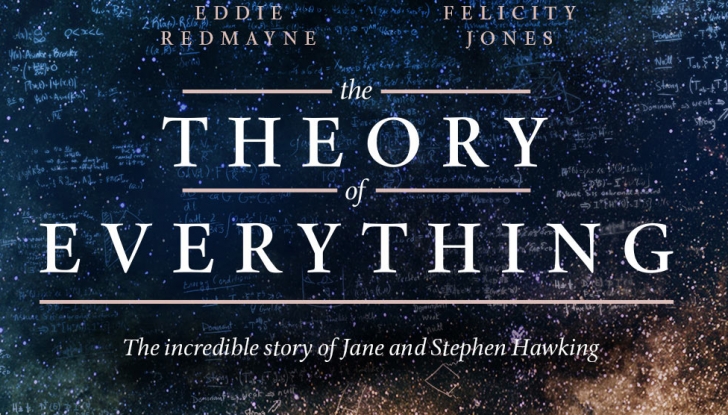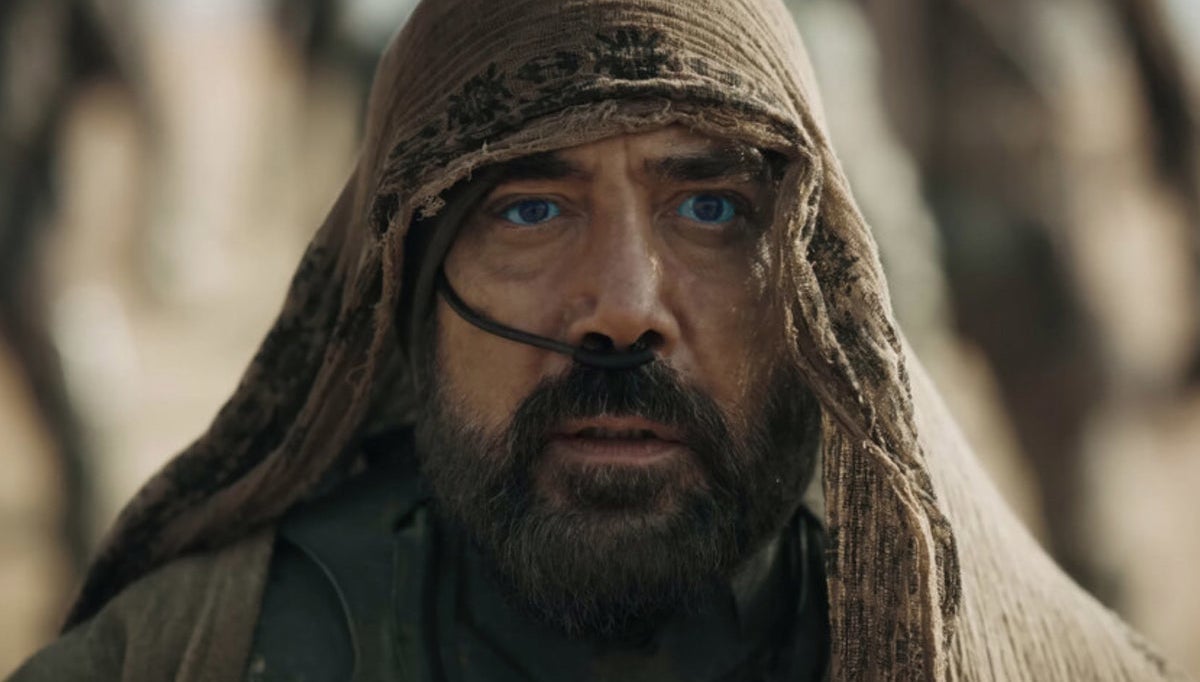Earlier this month, I got the chance to sit down with The Theory of Everything star Eddie Redmayne and director James Marsh (you might also be familiar with Marsh’s work from the incredible Man on Wire). The two talked about the challenges of portraying theoretical physics on film, the joy of working with co-star Felicity Jones, and collaborating with Stephen Hawking… and I didn’t make a Les Mis joke even once. Look down, and read on.
Reporter: How daunting a prospect was this project?
Eddie Redmayne: When I got the part, the stakes felt pretty high, and for several reasons. Firstly, you’re depicting a living human being who’s also an icon and telling their family’s story, secondly you’re representing a disease that is a brutal disease and in the preparation for several months I was meeting people suffering from ALS and I feel like they invited me into their lives and I wanted to make sure I did them justice. And then there was the science element, also being absolutely true to the discoveries and being authentic to that and then the thing of just making a film, making it enjoyable. So yeah, the answer is, it was pretty daunting.
Reporter: How did you balance science and love in the film?
James Marsh: That’s an interesting question, because essentially our primary objective was to make a balance between these things, but the perspective offered was always the relationship, the love story. And that gave you access to Stephen’s academic life and ideas, which were being kind of supported and enabled by Jane’s… forbearance and dedication. So I was more comfortable about the emotional life of the film than I was about the science. I’m not a scientist, I don’t understand theoretical physics any more than most people do, and so the objective became to try and distill that into simple imagery that wasn’t pretentious or overly complicated but gave you some idea of what Stephen was trying to get at with theoretical mathematics, which you can’t really discuss in a film. It’s not really the right medium for discussion of mathematics.
Reporter: I know you say you’re not a scientist, but you must have had to pay a lot of attention to the science if you didn’t want a bunch of scientists coming after you…
Marsh: Absolutely. This is Stephen’s career. We tried to make it very simple in a way. I felt that if I got it, then the audience would, so I positioned myself as a fairly ignorant person, but interested in this stuff. Obviously the Universe opens us up to big questions, and Stephen’s inquiries were about that, our very existence, in a very profound way. But my idea was to make it kind of simple and playful and visual. I tried to bring a playful, anecdotal quality to the visualizations of ideas.
Reporter: [To Redmayne] How did you focus on representing Hawking at the same time as giving your own performance?
Redmayne: Well, firstly, I wish I could say that the script was just given to me. But I read the story, and I thought I was going to read a biopic of Stephen Hawking. I’d been at Cambridge where Stephen was and had seen him from a distance, sort of knew that he had done something on black holes, but that was pretty much the limit of my knowledge. I just found it [the script] a complete revelation that subverted all my expectations. It was kind of a deeply passionate but complicated love story, and what we dream of is telling interesting stories, so I fought quite hard to get the job. But what’s interesting is there’s a disconnect. You get offered the job and you’re like “Yay! Ahh! I have no idea how to do this!,” and so what was interesting was then the fear and the expectation drove me. I did see that there was a lot of potential to mess it up but it just drove me to research and work as hard as I possibly could at it.
Reporter: When you say that you saw him in Cambridge…
Redmayne: I was at University there, I studied History of Art at Cambridge. So you’d see him, that famous, iconic image of him going over one of the bridges and then you’d occasionally overhear his voice.
Reporter: How much did you change as a human being after playing this role?
Redmayne: The thing that I changed or I learned meeting Stephen–meeting many of the people suffering from ALS and their families, but specifically Stephen–when you are given that sentence, your entire notion of time shifts and changes, and he has made the choice to live every moment of his life as fully, as passionately as he can. And certainly in my life, the daily worries or foibles that fill your mind, it put everything into perspective and was just a constant reminder to try and live fully, and that’s what I took from the film.
Reporter: How did you shake off your role emotionally?
Redmayne: I’ve got to say, it was a pretty intense eight months. I haven’t worked since. It did take a while, and I’m not a method actor, I don’t quite understand what that is, but the amount of time that went into that prep particularly and the physicality, spending all those months beforehand so the physicality was so embedded that I could jump between different time periods in the same day, and also not be thinking about physicality, playing with Felicity [Jones, as Jane Hawking], playing a human story… it just took a while to come out of it. I’m still trying to make sense of it, I suppose.
Reporter: So much of your performance depends on Felicity’s performance. Could you tell me how symbiotic that was?
Redmayne: Symbiosis is probably the word that I feel like Jane and Stephen had for a long time, and Felicity and I found. She’s an old friend, we started doing theater in London and I admired her hugely from afar, and when I found out she was doing the film it was great because we leapt in at a level of trust already. But it was rancidly hard for her. Normally when you’re acting, you’re talking about how can we do this, let’s try it a few different ways, but every scene I come with limitations. So much of the heavy lifting was her work but also we had to learn, Felicity describes it beautifully, the carer becomes an extension of the sufferer’s body until it’s almost like a dance together. So that was all work that we did together, but she was formidable. Also Jane is less known than Stephen, so Felicity could have chosen to play her any way that she wanted. But she was vigorous about finding the truth to Jane, that incredible, amazing strength and yet fragility. And her voice, the voice work and physicality was really exploratory.
Reporter: Obviously Jane and Stephen are both very strong characters. What was it about Jane in particular that was interesting to you?
Marsh: What I liked about this script was the equality of point of view between Stephen and Jane, that’s what really drew me to it, this female perspective. What would it be like to be the wife, the mother, the lover in this situation, and that’s why Felicity’s performance was so important to me, and why, in cutting the film, I gave her a strong voice. In fact, the first assembly of the film, everyone was taken aback, “Oh, my God! It’s about Jane! How did that happen!” I was so intrigued, by… Stephen was a given, of course, and as we worked through it it became more balanced between the two of them, but it’s definitely a joint film, and that’s what I liked about it.
Reporter: I read somewhere that The Danish Girl [a film about Danish painter Lili Elbe, one of the first transgender women to receive sex reassignment surgery] is next for you?
Redmayne: It’s an extraordinary story, a true story, again, about a couple in the 1920s, and it’s about identity and, similar to The Theory of Everything I suppose, it examines the fact that we have one life on this planet, and how complicated and difficult that is and how brave of a choice that is in that period when no one had transitioned into a woman. And so the risk of death, which was a gigantic risk in order to be true to one’s self.
Reporter: Are you doing anything specific to get into the mindset of a woman?
Redmayne: I’ve been meeting transgender women from the community and just trying to educate myself.
Reporter: You said you were at Cambridge. Did you ever get a chance to meet Stephen there?
Redmayne: In the process of preparing for the film I met Stephen about five days before we started filming. That was a beautiful moment. Felicity was visiting Jane, and I found Felicity upstairs in Jane’s closet trying on clothes. My other favorite moment with Jane was our first day of filming in Cambridge, we were on set and she ran up and said “no no no his hair would be much messier, “and she was literally… I was getting Jane Hawking to style Stephen Hawking’s hair, it was surreal.
Reporter: What was his reaction to doing this movie about his life?
Redmayne: I haven’t seen him since he saw the film, but I saw him just before he was going to see it, and I said to him, “I’m very nervous. Please let me know what you think.” And it takes him a while to communicate now, it takes him 5 to 6 minutes, then he said in his iconic voice , “I will let you know what I think, good… or otherwise.”
- The Theory of Everything: Review
- Interview with Felicity Jones
- Check out the international trailer here
Are you following The Mary Sue on Twitter, Facebook, Tumblr, Pinterest, & Google +?









Published: Nov 11, 2014 02:47 pm